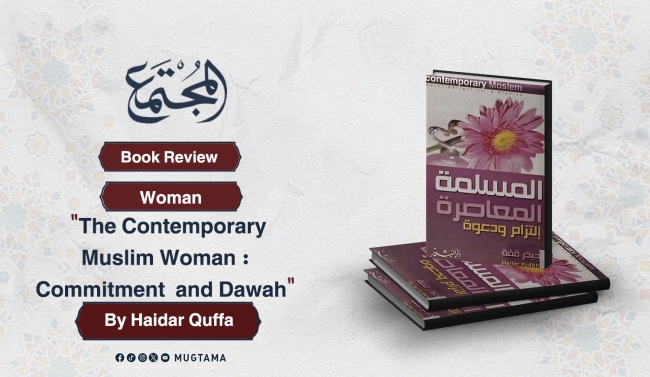Book Review: “The Contemporary Muslim Woman: Commitment and Dawah” By Haidar Quffa
The Palestinian preacher and writer Haidar Quffa, in his book “The Contemporary Muslim Woman: Commitment and Dawah,” discusses personal experiences during his travels. He reflects on the state of women adorned with makeup and revealing attire on a flight he was on and describes how he indirectly advised and guided them. He later addressed Muslim women directly through this book, offering a roadmap for moving from ignorance to the light of Islam.
The book, published in 1408 AH / 1988 CE, highlights the virtues promoted by Islam, emphasizing that this religion is not merely about appearances or superficial manners. Instead, it is a comprehensive system of ethical values that translate into real-life actions. Among these virtues are truthfulness, trustworthiness, keeping promises, cheerfulness, generosity, humility, attentive listening, and valuing others—traits that capture hearts and ears alike.
Quffa elaborates on the Muslim woman’s relationship with the Quran, encouraging its recitation, memorization, and practical implementation of its rulings, commandments, and prohibitions. He reminds every Muslim man and woman of the importance of understanding and reflecting upon Allah’s ayahs, studying the Quran’s rulings, and adhering to them. This adherence involves two dimensions, temporal commitment as regularly reading the Quran daily and practical and intellectual commitment , applying its teachings and making it the guiding principle of one’s life and decisions.
The author asserts that a Muslim woman should be a Quranic woman, with the Quran shaping every aspect of her life—her speech, attire, adornment, and actions—so that she becomes known among people for this distinct character. He affirms that this is achievable for anyone who sincerely seeks goodness and dedicates their intention to Allah.
Regarding the woman’s relationship with the Sunnah of the Prophet ﷺ, Quffa delves into its significance and emphasizes imitating the Prophet’s example. He warns against hypocrites and those who cast doubt on the Sunnah. He suggests several approaches to strengthen this relationship:
- Investigating the origins of customs and traditions.
- Following the example of the Prophet ﷺ without procrastination.
- Encouraging others to adhere to the Sunnah.
He stresses that the Sunnah, alongside the Quran, should govern all aspects of human life.
In the section titled “Your Duty towards Islam” the author highlights the primary mission of human beings on earth: worshiping Allah, calling others to Him, spreading Islamic values, encouraging adherence to them, combating wrongdoings and misguidance, and not evading responsibility. He calls on women to be proactive, never despairing of reform, and tirelessly promoting virtue.
Quffa, the member of the International Union of Muslim Scholars and the World Association of Islamic Literature, underscores the importance of winning hearts and freeing them from the false allure of materialism. He urges Muslim women to fulfill their dawah duties by using wisdom and kind advice. This includes utilizing gifts, visits, and personal example in calling others to Allah, promoting modesty, confronting immodesty, and correcting the flaws of their peers with gentleness and humility. He encourages women to endear others to goodness and modesty while asking Allah for sincerity in their efforts.
The author poses the question, “Are you alone on this path?”, and answers that the path of dawah is difficult and long, yet its reward is immense. He emphasizes that calling to Allah is not the sole responsibility of men but a duty for women as well. He encourages Muslim women to expand their dawah efforts and attract others, ensuring that they persevere with sincerity and dedication despite obstacles like rejection, indifference, or resistance. The goal is to transform society into the ideal Islamic community.
Quffa also discusses aspects of modern life that originate from the West—elements that neither align with Islamic values nor reflect the traditions of Muslim societies. He points out the consequences of this cultural and intellectual invasion, such as the erosion of identity, the promotion of strange fashion trends, revealing clothing, and bizarre hairstyles. These are marketed through massive advertising campaigns, leading to weakened resistance among women and diminishing the ability of men to curb these influences. Consequently, social norms have unraveled, and moral breaches have widened.
The book warns of the Zionist agenda behind promoting immodesty and moral decay. It highlights the dangers of television, cinema, theater, sports, and other distractions that cause people to neglect their prayers, waste their time, and lose focus on the remembrance of Allah. These distractions not only hinder people from fulfilling their worldly and religious duties but also actively divert them from the path of righteousness.
In the final section, titled “A Dynamic Cultural Methodology,” Quffa outlines several steps to guide the contemporary Muslim woman toward achieving the balance between commitment and dawah. These steps include:
- Spiritual Development: Purifying the soul through consistent prayer, fasting, remembrance of Allah, supplication, seeking forgiveness, performing night prayers, and self-accountability.
- Intellectual Growth: Educating oneself and nurturing the mind with beneficial and useful knowledge, staying informed about one’s surroundings, family, and community.
- Active Application: Implementing Islam in all aspects of life, broadening the scope of reform, and calling others to Allah. This includes attracting new women to the path of righteousness and strengthening the field of commitment and dawah.
By embodying these qualities, the contemporary Muslim woman can become a role model, a source of inspiration, and a driving force for her community toward the path of truth, goodness, and success.
-------------------------------------------------------------


